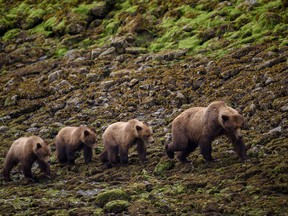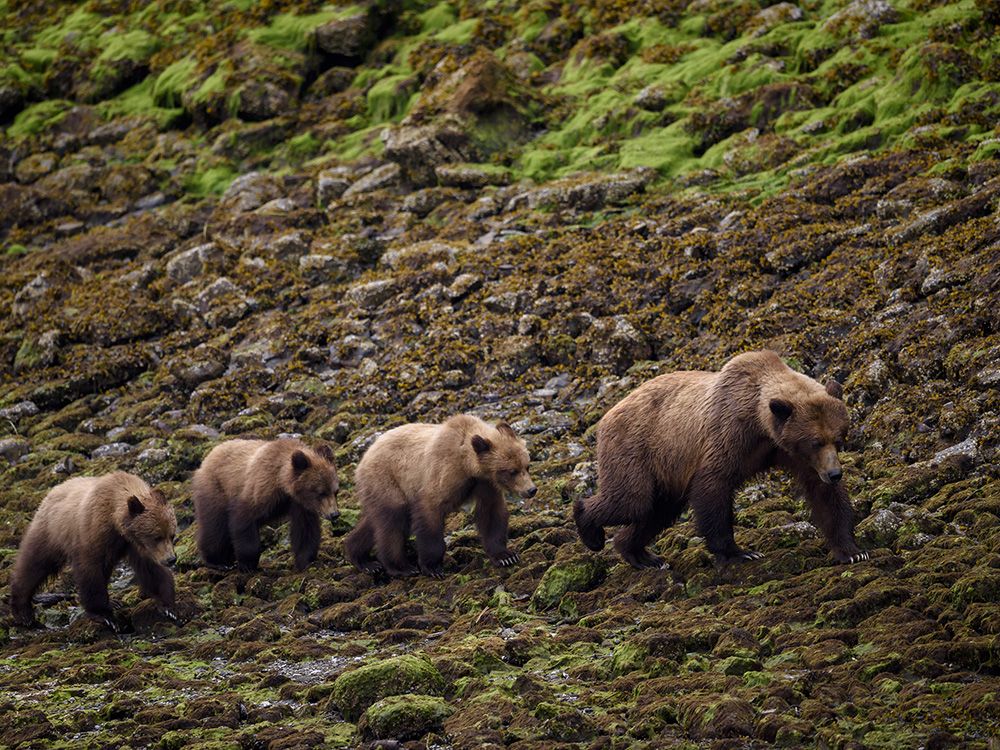Five years after B.C. banned grizzly hunting, some conservationists fear it could be up for discussion again

Article content
A proposed “stewardship framework” that could enable changes to B.C. laws related to grizzly bears has some conservationists worried it will open the door to trophy hunting.
Apart from hunting by Indigenous people for food, social or ceremonial purposes, the B.C. government banned all grizzly hunting on Dec. 18, 2017.
Article content
The decision remains controversial.
Advertisement 2
Article content
Five years later, the proposed B.C. grizzly bear stewardship framework attempts to set a new direction for how B.C. relates to grizzlies. The document considers “approaches to meet stewardship goals” and summarizes science, knowledge and differing perspectives, including First Nations.
But what that means on the ground isn’t clear.
“What the province really needs is an action plan, not a touchy-feely document,” said bear biologist Wayne McCrory.
The founder of the Valhalla Wilderness Society is worried the document’s ambiguity could eventually allow some licensed hunting of grizzly bears in B.C.
The document recognizes some Indigenous nations have a “deep understanding” that grizzly bears should not be hunted.
“There are also Indigenous communities that have an economic interest in guide outfitting and grizzly bear hunting,” it goes on to note. “For some of these communities, the closure of the grizzly bear hunt resulted in negative economic impacts. … Some nations have expressed interest in reinstating a licensed hunt to provide a source of local income.”
Article content
Advertisement 3
Article content
The framework is intended to inform land and resource planning decisions, while enabling “amendments to policy, legislation, and programs related to grizzly bears.”
But it is not likely to throw open the door to grizzly hunting right away.
Some First Nations choose to hunt grizzly bears as part of their traditional practices, says the draft. “Should licensed hunting be considered in future, it would require a more detailed and focused review of Indigenous and non-Indigenous perspectives, science, and policy (including population objectives, cumulative effects, and threat mitigation).”
In a statement, the Ministry of Forests said the framework simply summarizes different perspectives. B.C. remains closed to all licensed grizzly hunting, with “no open season anywhere in B.C. for licensed hunting of grizzly bears, regardless of who owns a guide territory.”
The Tahltan Central Government in northwestern B.C. makes no secret of its support for resuming the grizzly hunt in its territory, said president Chad Norman Day.
Hunting bears has always been — and continues to be — a way to manage predators and protect ungulate species, such as cariboo and moose, he said. The Tahltan government has incentivized Tahltan hunters to kill grizzlies with a $1,000 bounty, but even so, ungulate numbers continue to decline.
Advertisement 4
Article content
“Tahltan hunters are not harvesting enough predators to keep the population in check,” he said. “Not even close.”
The nation supports opening the grizzly hunt to B.C. resident hunters and outfitters as part of its wildlife management strategy.
Day noted there are far more grizzly bears in Tahltan territory than people. The nation’s ideal situation over the next decade would be to co-manage wildlife with the B.C. government, employing best practices in science and knowledge, rather than what “makes people in Vancouver and Victoria feel good.”
The provincial government is accepting public feedback on the draft grizzly bear stewardship framework until Sept. 8.
Consultation was originally open until Aug. 18, but with many bear guides, biologists and outfitters off the grid during the summer, advocates petitioned the government to extend the deadline to the end of the year.
The framework notes that when grizzly hunting was banned in 2017, it was not “specifically or directly in response to a conservation concern. Rather it was largely a reflection of many British Columbians’ ethical or moral opposition towards grizzly bear hunting.”
Advertisement 5
Article content
At the time, Grand Chief Stewart Phillip of the Union of B.C. Indian Chiefs said he welcomed the ban, with few First Nations involved in hunting bears. Many coastal First Nations have also spoken out against hunting grizzlies.
But both the hunt, and the closure of the hunt, continue to generate strong emotions in B.C. and beyond.

The ban led to a court challenge by several guide outfitters, led by hunting guide Ron Fleming. In a 2022 article in GearJunkie, an outdoor news platform, Fleming said that before the ban he would take about 20 hunters each year to stalk 12 government-allotted grizzly bears, each paying about $15,000. In the article, he estimated his company, Love Bros. and Lee, had lost $300,000 to the ban each season since.
Several B.C. conservation groups applauded the government for attempting to create a stewardship-based plan for grizzlies, as opposed to past management plans that existed to determine how many bears could be hunted.
“It’s very close (to a good plan),” said Nicholas Scapillati, executive-director of the Grizzly Bear Foundation. “But if this goes through as proposed, it would mark a failure of this government.”
Advertisement 6
Article content
Scapillati said the document is too vague to be useful and “leaves the door open to hunting.”
Chris Genovali, executive-director of the Raincoast Conservation Foundation, said trophy hunting lobby groups have been “working tirelessly behind the scenes” to have B.C.’s grizzly hunting ban overturned. “So I think many people are suspicious right now.”
“I like the work they’ve done, but it’s lacking the how,” said Katherine MacRae, executive-director of the Commercial Bear Viewing Association. “There are definitely some red flags.”
Genovali said bear viewing revenue outstrips hunting if an economic rationale is needed to protect grizzlies.
McRory didn’t mince words in his assessment of the framework.
He said grizzlies are most threatened by habitat loss, but the framework doesn’t spell out what might be done to address the problem, such as limiting development or logging in certain areas.
“Unless the government sets strict standards on hunting, this is going to come back and bite them,” he said. “They should wake up to what really needs to be done.”
-

‘Bears know no borders:’ Washington state considers options to reintroduce grizzlies in wilderness near Manning Park
-

Parks Canada steps up enforcement after three grizzly bear deaths in three weeks
-

UBCO researcher urges a delay to trapping season to save grizzlies’ toes
-

Guide outfitting company launches class-action suit against B.C. ban on grizzly bear hunt
gluymes@postmedia.com
Summer subscription sale: Our in-depth journalism is possible thanks to the support of our subscribers. For a limited time, you can get full online access to the Vancouver Sun and The Province, along with the National Post and 13 other Canadian news sites, for just $40 for one year or $1 a week for 52 weeks. Support our journalism by subscribing today: The Vancouver Sun | The Province.




















Comments
Postmedia is committed to maintaining a lively but civil forum for discussion and encourage all readers to share their views on our articles. Comments may take up to an hour for moderation before appearing on the site. We ask you to keep your comments relevant and respectful. We have enabled email notifications—you will now receive an email if you receive a reply to your comment, there is an update to a comment thread you follow or if a user you follow comments. Visit our Community Guidelines for more information and details on how to adjust your email settings.
Join the Conversation